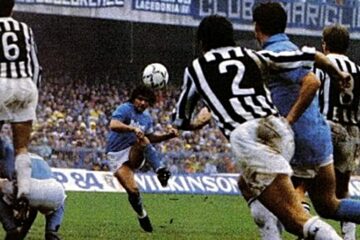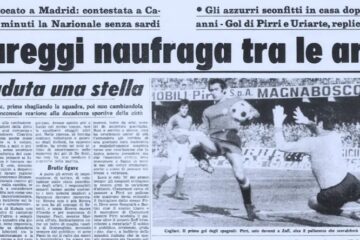1986! When Roma Threw Away a “Scudetto” Chance!
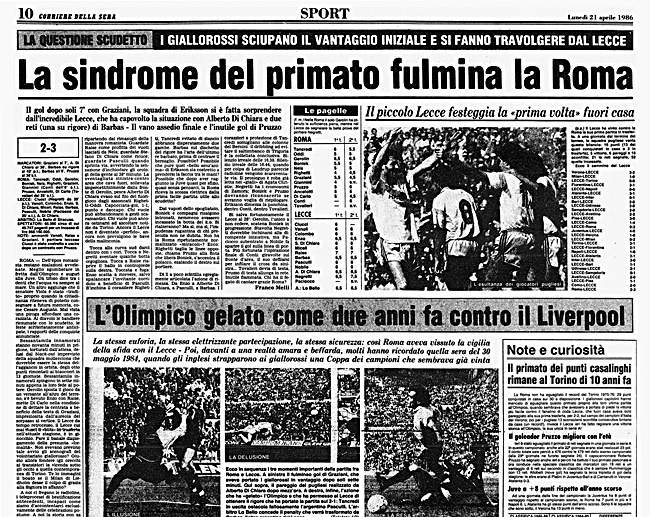
The unforseen!
Juventus won the title because Roma lost it
April 20, 1986, an unexpected defeat:
Roma falls to Lecce and says goodbye to the Scudetto!
The most incredible of results; a possible, unpredictable and, until a few months before, unexpected footballing feat is thrown to the wind when no one would have imagined it.
This is Roma – Lecce of April 20, 1986. To think that the 1985 – 1986 championship was about to end almost before it got into full swing.
One match is important in the chronology of that season, so much so that it has an impact on the history of the years to come.
It is the match of November 3, 1985, Napoli-Juventus.
We are on the ninth day of the first leg of a championship that seems like Juventus is literally killing it. In the first eight days, the “Bianconeri” have never marked the pace, only victories and no points left along the way, giving the impression of being a real steamroller that leaves no escape to any opponent: never before has such a long streak of consecutive initial victories been recorded in a championship with 16 teams.
Pouring rain on a “San Paolo” packed with spectators, as always happens when the Old Lady arrives. Napoli holds its ground against the league leaders, creating no small amount of difficulty from a tactical point of view, even if that spark that could break the balance is missing.
In the 72nd minute, a free kick for the home team is called in favor of the Napoli inside the Juventus penalty area, in a lateral position with respect to the goal defended by Stefano Tacconi. The wall is positioned in such a way as to cover the first post and seems to give the Juventus goalkeeper a good night’s sleep, certain that it would be physically impossible for the opposing striker to direct the ball to that side and, therefore, more concerned with covering the other front with his own position.
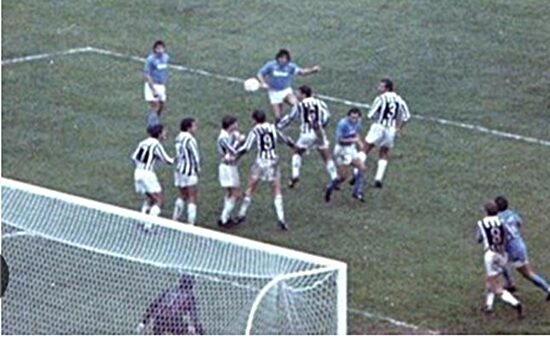
For everyone it would be impossible, or rather for ordinary mortals. Not for Diego, capable of overturning the laws of physics with that magical left-footedness he has.
After suggesting that Eraldo Pecci should just kick the ball, perhaps not even he was so convinced of his captain’s ballistic abilities at that time, also due to the heaviness of the pitch, now made almost unplayable by the pouring rain, Maradona lets loose a magic shot that traces an unimaginable trajectory and sends the ball into the top corner, where the good Tacconi would never have thought it possible to place it.
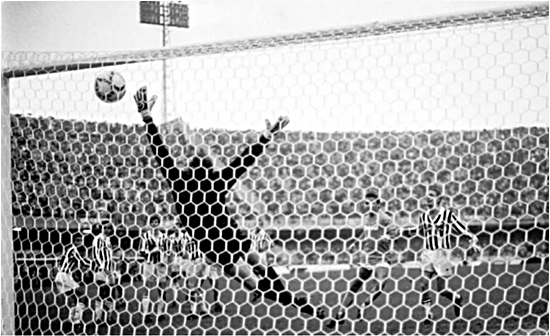
In its simplicity, a goal from another planet. Even today his teammates and all football lovers wonder how he managed it. After all, perhaps not even scientists could explain it. The stadium explodes in incredulous joy, it is in total ecstasy. Juventus must surrender to the feat of the pibe de oro, loses the match and the unbeaten record.
That victory, moreover, will prove to be fundamental for the destiny of Napoli in the years to come. The Neapolitan team overcomes a Juve that until then seemed invincible and frees itself of a mental weight of quintals or tons of lead. It becomes clear that with that Maradona nothing is impossible and that even the Old Lady is beatable.
The team doesn’t look bad. There is no shortage of those in the environment who are confident that the Giallorossi team has improved a lot compared to the previous year and that, therefore, it can lead a high-level season.
The new arrivals should ensure that speed of maneuver that was lacking the year before. To tell the truth, the pre-season games and the initial ones of the Italian Cup had not always been exciting and here and there a spark between this or that player and the coach Eriksson would not have been lacking.
The championship began, as mentioned, with the exploit of Juve, winner for 8 rounds. But then the Old Lady glided to more normal heights. Roma in the first half of the season did not give any indication of great things. The Giallorossi team proceeded in alternating current: a good win in Bergamo with a good counterattack, a good reconfirmation with Udinese, but a dry defeat in Bari and a draw without infamy and without praise in Naples.
Convincing victory against Torino and a bad defeat in Avellino, a difficult pitch for the Romans at the time, where the visiting players gave worrying signs of internal conflicts with heavy bickering among themselves.
Sufficient victory against Fiorentina, but a poisonous defeat at Inter. The waters calmed down temporarily by beating Verona, the outgoing Italian champions, at home. But then an away game in Turin and an unequivocal defeat in the presence of Trapattoni’s Bianconeri.
Two home points followed against Milan, but then a surrender in Genoa against Sampdoria. Roma was at least not very consistent and went in fits and starts: they beat Pisa and then went on to win Lecce clearly with a 3-goal margin.
The first half of the season ended with a less than exciting home draw against a good Como, who had started badly but had been revitalized since November 1985 by the technical management of Rino Marchesi, who had already made his mark in Avellino and Naples years earlier. At the halfway point, Roma was 8 points behind Juve (and a victory was awarded 2 points).
With the return, the team from the capital is transformed and becomes lively, effective, almost appearing unstoppable with schemes interpreted wonderfully and, therefore, profitable: 6 victories in a row make substance, points and convince the experts that Eriksson’s ideas have now been sufficiently assimilated both in the offensive and containment phases. After the draw in Florence, a beautiful victory against Inter. The Giallorossi put on a show.
But immediately after a bad defeat in Verona by 3 to 2 calls everyone back to reality. The next round features the match Roma – Juventus, now decisive, with the former behind by 5 points. If Juventus comes out unscathed from the capital, the games are virtually over. But Roma outclasses Juve as has rarely happened in those years. The supremacy of the Giallorossi is total and
the final 3 to 0 may seem a narrow result for the home team. Now 3 points behind with 5 games to go.
But Roma is excited, and Juventus appears worn out and tarnished.
On the wings of enthusiasm, almost carefree and jovial, the team from the capital wins at Milan, beats Sampdoria at home, dominates in Pisa. Meanwhile, Juventus, after beating Inter, loses in Florence and draws with Sampdoria.
With two days to go in the championship, Juventus and Roma are tied on 41 points, but the Bianconeri seem, if not in crisis, at least in difficulty, while Roma exudes health from all sides and perhaps can only regret the home point lost months before against Como or some away defeats that could have been avoided.
But Roma recovered 8 points in 13 games.
A miracle.
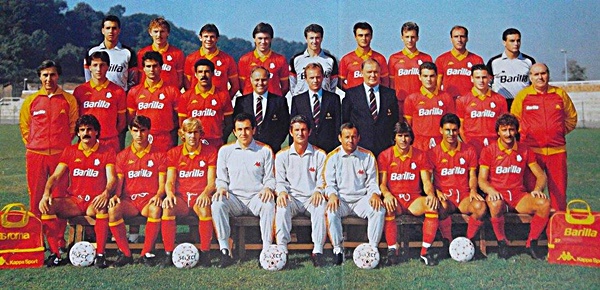
Something like this in previous years (but in that case it was 5 points) had only happened in the 1975-76 season. In that case, Torino took a scudetto that seemed won from Juve’s hands. But that was a Juventus torn by recriminations and heated internal controversies, in the face of which coach Carlo Parola was unable to mediate and remedy.
In the specific case of 1985-86, Juventus is not torn apart by internal confrontations: a cycle is coming to an end, glorious as it may be, and its forces are naturally waning. This while Eriksson’s Roma appears to be a new, fresh, growing power, and the Swedish coach’s schemes are fascinating, entertaining and particularly propitious, even congenial. Furthermore, the calendar seems favorable to the Giallorossi, who must face Lecce, absolute debutant in “A” relegated for some time, and the quiet Como, while Juventus must deal with the difficult Milan (also or above all difficult by tradition) and Lecce.
The forecasts, also for the comparative form between the two contenders, speak in favor of Roma. Public opinion thinks that the club from the capital can easily or almost easily conquer 4 points in the last two days. There are many doubts, therefore, that Juventus can collect them all in full and, in any case, in the event of a play-off, the team from the capital is considered the favorite.
The prospect of the 1980-81 championship seems to have been overturned, when Roma had remained in the lead for a good part of the championship (without, however, ever being able to boast an 8-point gap over Juventus; indeed, as the championship settled down, in general they had not gone beyond 2 points) and had been caught and overtaken by the Bianconeri at the finishing line.
But Juve has the mentality and the habit of winning on its side, even when it is not the favourite on paper, as happened in 1967 or 1973. Furthermore, Trapattoni had amply demonstrated that he was a specialist in heart-stopping Scudetto sprints, having triumphed in 1977 (as a debutant), in 1981 and in 1982 (but in those cases he started from behind and, therefore, was not caught and recaptured after a breakaway).
And this is apart from the corollary of victories also at international level that Juventus could show off in those last years, including a good part of the world champions of the Spanish World Cup and Platini.
And perhaps also thanks to this tradition and this experience Trapattoni manages to draw from a tired team those residual nervous energies such, on the one hand, as to not feel the mental fatigue of having been caught at the top of the standings after a historic comeback, and such, on the other, as to be able to overcome, despite the physical exhaustion, both Milan and Lecce, collecting 45 final points. Roma, for its part, considers the challenge with Lecce as already overcome.
A formality, almost a nuisance of the calendar, such as to induce the otherwise composed president Viola to a premature lap of the field before the challenge with the Salento team began. After all, the latter had not only been relegated for weeks but also, in a broad sense, “inexperienced” because it was their first year in “A”.
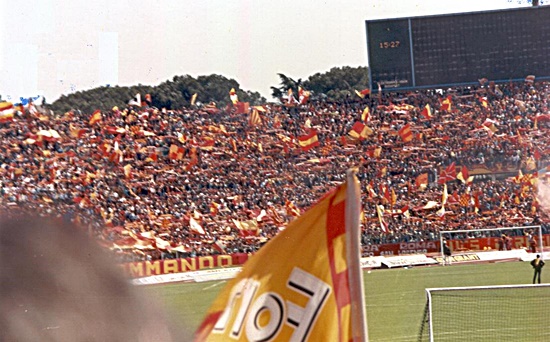
But perhaps this sort of lack of consideration induces the Apulian team to play a vibrant match, without conceding anything to the home team. Thus the carefree competitive verve of the Giallorossi became euphoria mixed with opportunistic calculation in view of a foreseeable play-off (see the failure to use Bruno Conti immediately).
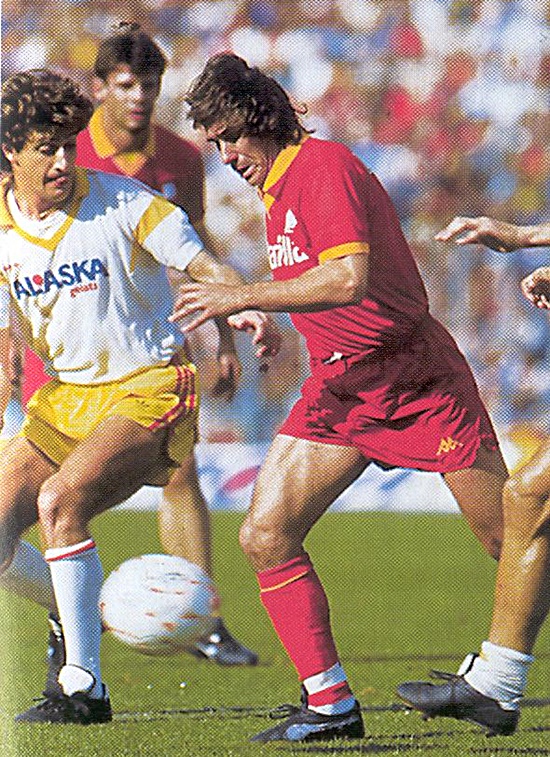
Only the Swedish coach allowed himself to observe that he did not trust Lecce, who, I recall from the sports press that week, went to Rome calmly and without neglecting the possibility of attempting a coup. Sixty-five thousand spectators provided an immense backdrop for a footballing head-to-bottom. The Roma fans were convinced they had the two points in their pocket.
Roma scored after six minutes with Graziani and the game seemed to be going downhill. Roma deluded themselves into thinking they had closed the account. But former Di Chiara, perhaps with some accounts to settle, equalized.
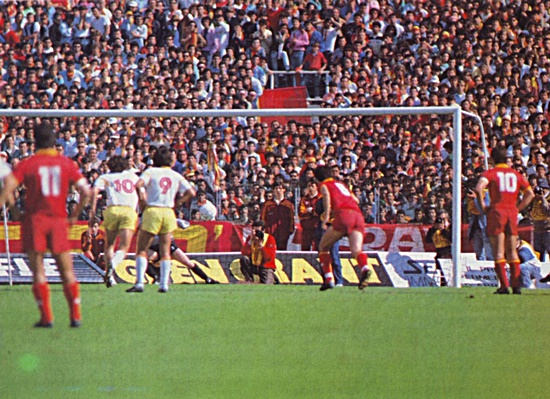
The Argentine Barbas let loose, and the Lecce team took the lead at 1-3.
Roma launched an attack, but perhaps not having taken the impossible into account took something away from the Giallorossi. Eriksson’s team was eager, impulsive and insistent, but not as effective as on other occasions.
Pruzzo closes the gap, but there is no further to go. The Lecce goal, after all, is bewitched. The second goalkeeper from Salento, Negretti, who replaced the starter Ciucci, who was injured after about twenty minutes, plays the game of his life. Fate has turned against Roma.
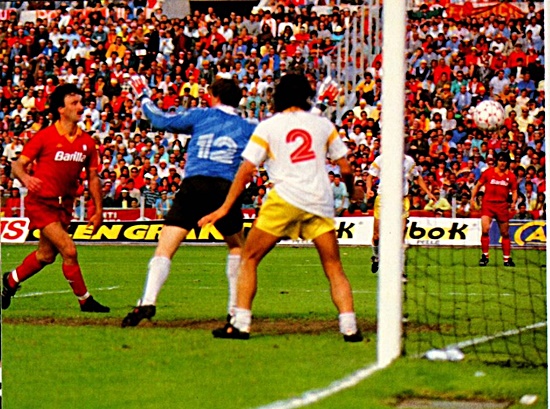
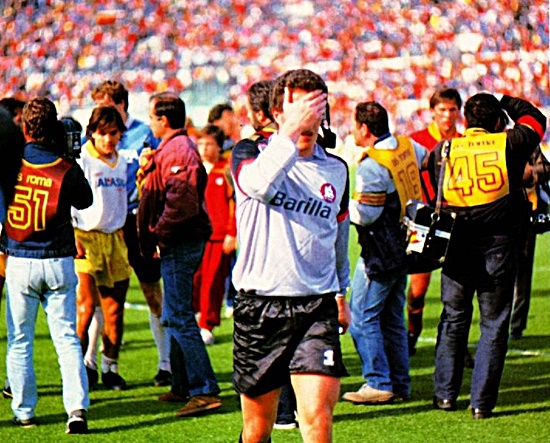
In this one, however, the Giallorossi have at least made a mistake in their approach to the match, then losing mental strength as the minutes pass. A bit like what happened to Fiorentina in Cagliari on May 16, 1982. In these cases, Juventus has an extra gear, given the habit of winning. However, as in 1981, Roma would have partially mitigated the disappointment of not winning the Scudetto by winning the Coppa Italia.
Day 19th: “Olimpico” Stadium in Rome
April 20, 1986
TM: 15;30
Roma: Tacredi, Oddi, Gerolin, Boniek, Nela, Righetti, Graziani, Giannini (53`Conti), Pruzzo, Ancelotti, Di Carlo (69` Tovalieri)
Coach: S. G. Erikson
Lecce: Ciucci (26`Negretti), Vanoli, Colombo, Enzo, Di Chiara, S. Miceli, Raise, Barbas, Pasculi, Nobile (68` Padocco), A. Di Chiara
Coach: E. Fascetti
Spectators: 63, 419
Referee: Lo Bello
Scorers: 7` Graziani ®; 24` Di Chiara (L); 40` pen. Barbas (L); 53`Barbas (L); 82`Pruzzo ®
Yellow Card: Vanoli, Raise, Graziani, Conti
Corners: 20-2 in Roma`s favor
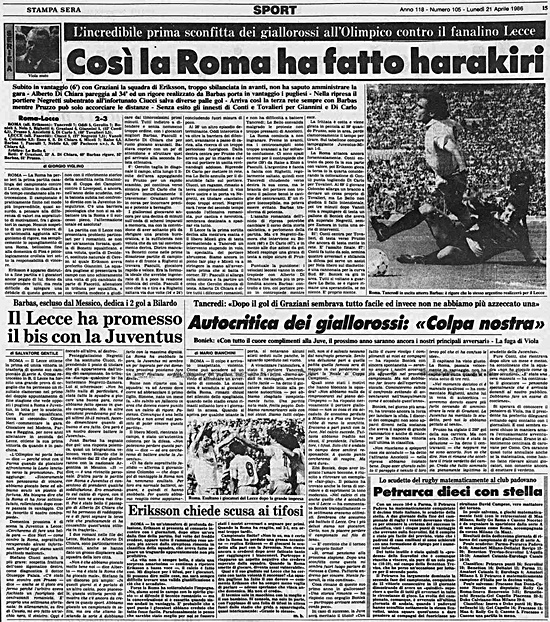
By Pjerin Bj
New York: April 14, 2025
_____________________
Sports Vision + Plus / Champions Hour in activity since 2013
Discover more from Sports Vision +
Subscribe to get the latest posts sent to your email.


